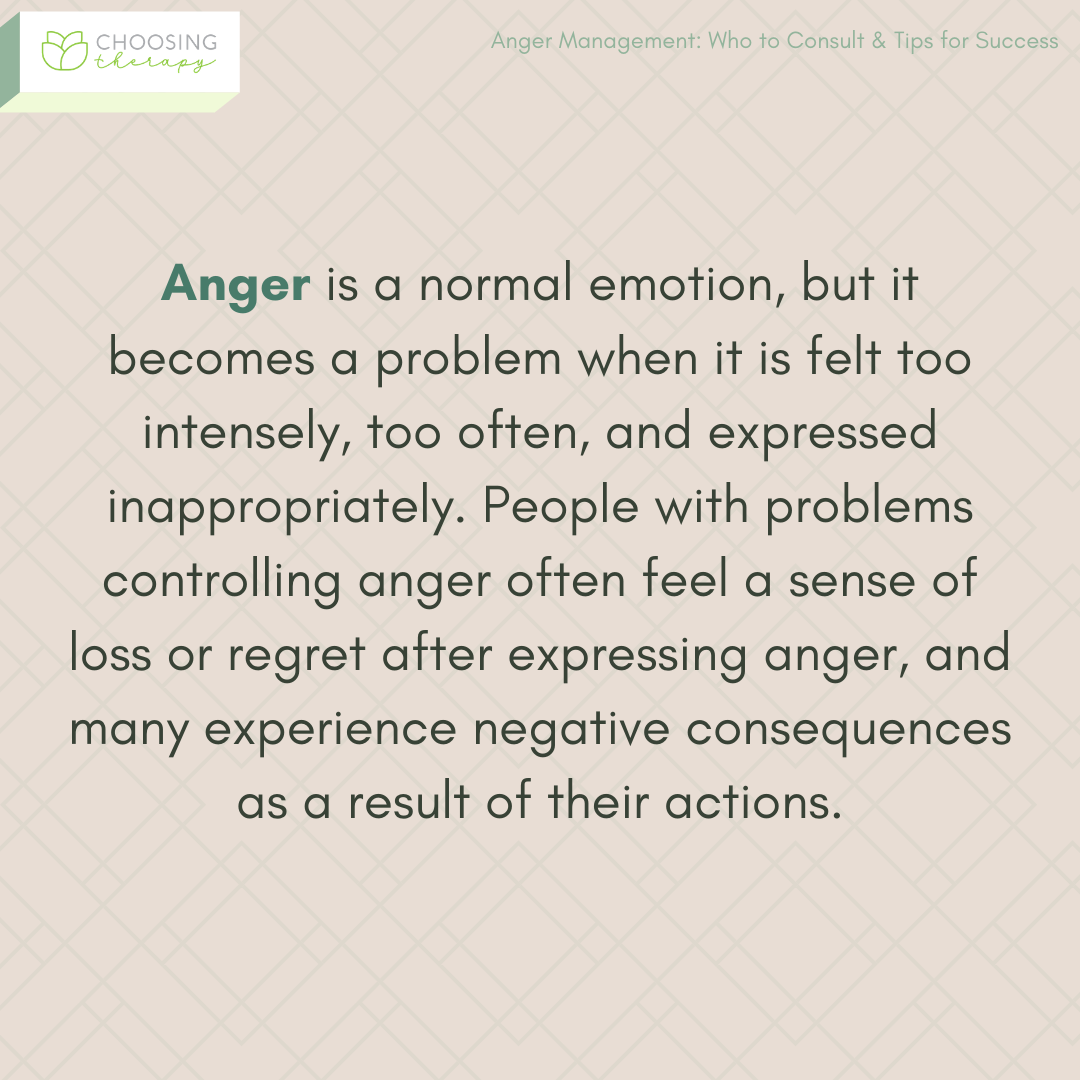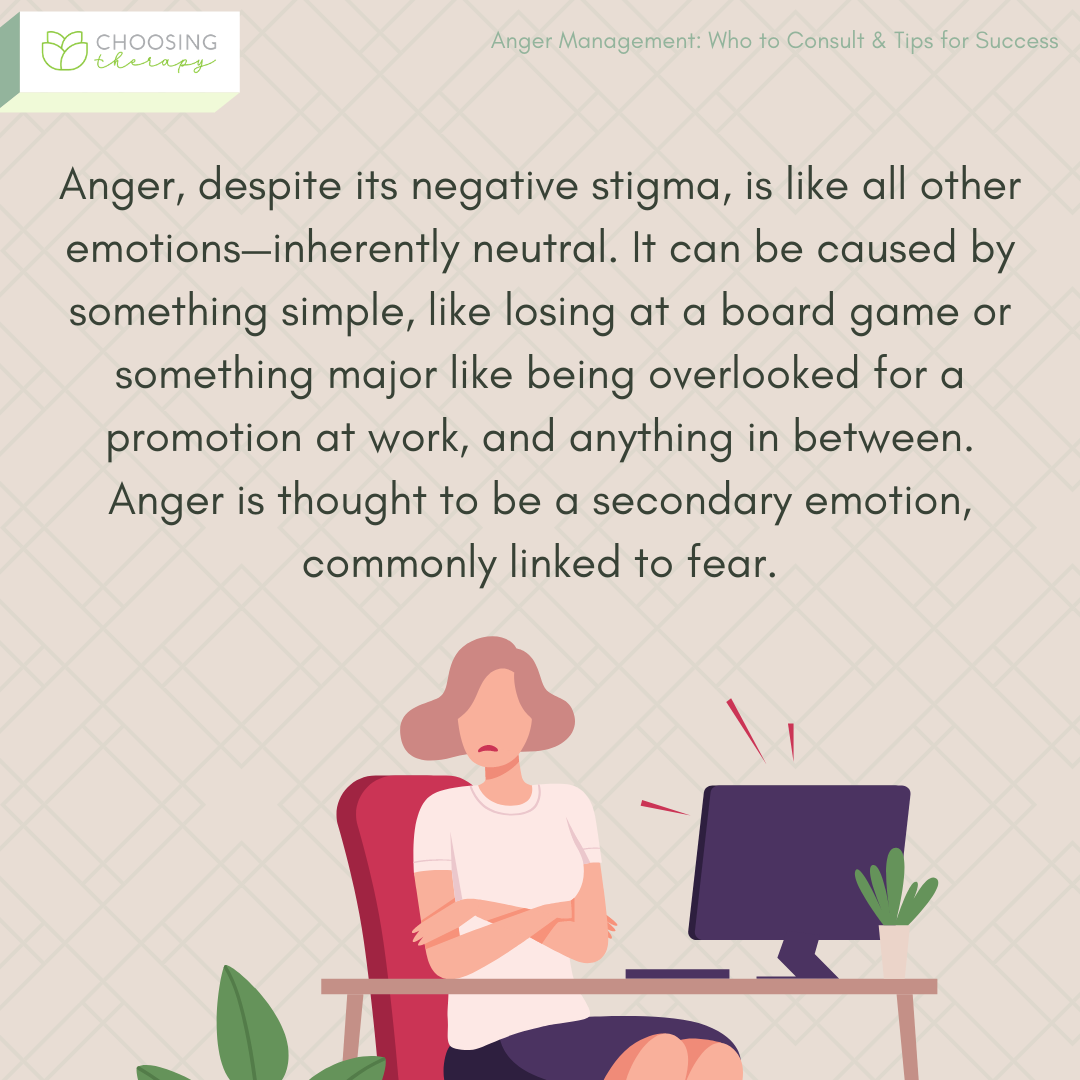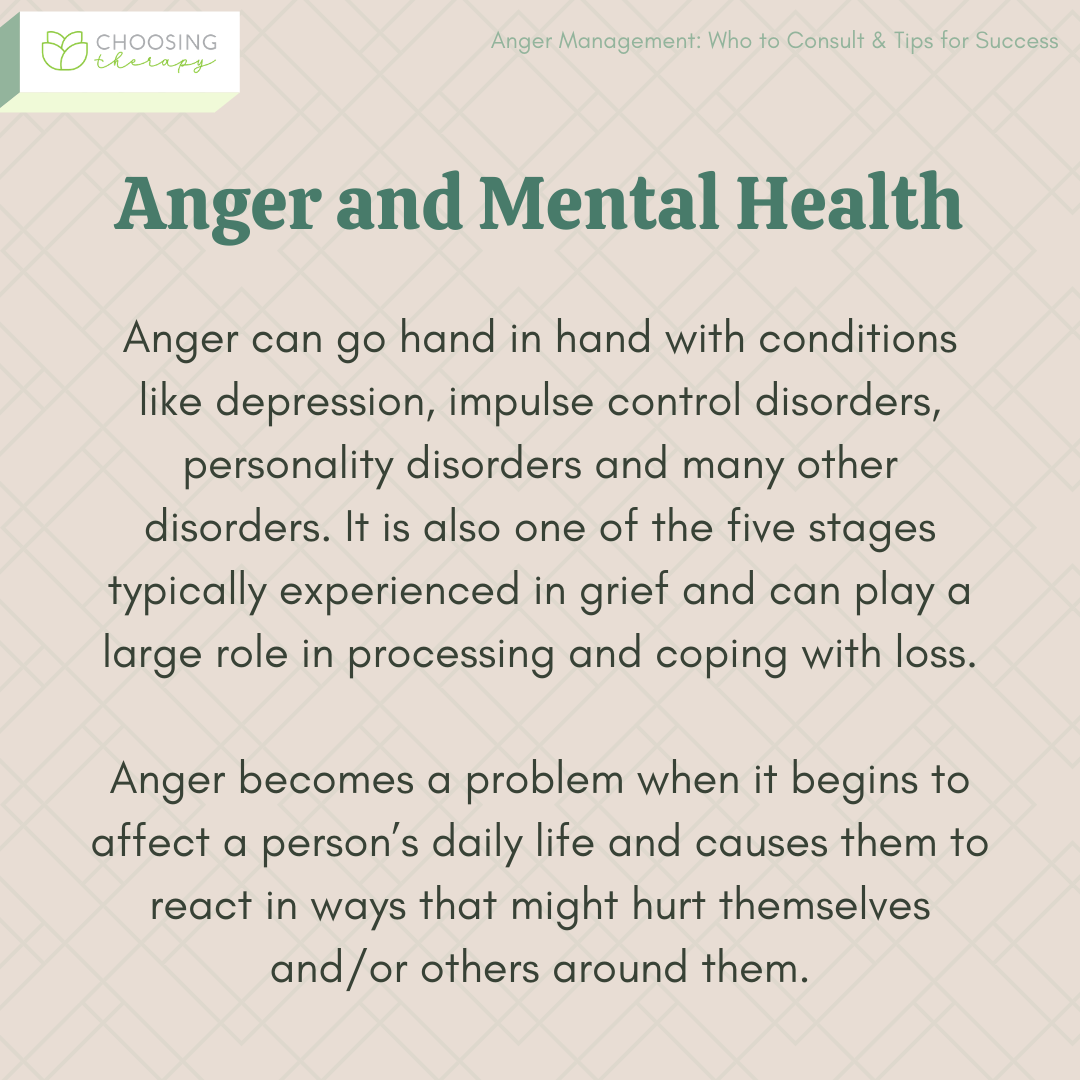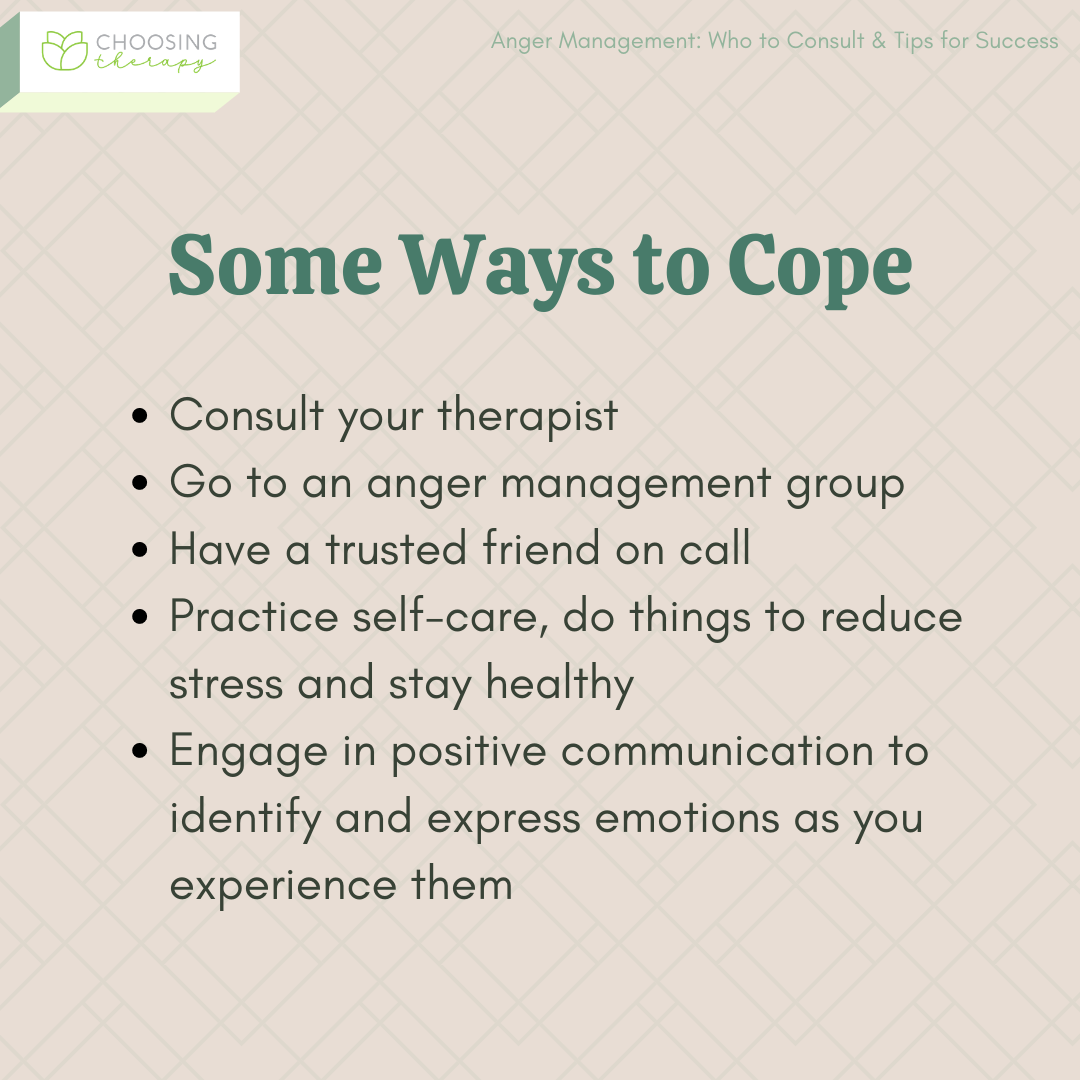Anger is a normal emotion, but it becomes a problem when it is felt too intensely, too often, and expressed inappropriately. People with problems controlling anger often feel a sense of loss or regret after expressing anger, and many experience negative consequences as a result of their actions. Some ways to deal with anger include attending an anger management class, talking with a therapist, and relaxation techniques.
A therapist can help you control your anger. BetterHelp has over 20,000 licensed therapists who provide convenient and affordable online therapy. BetterHelp starts at $65 per week. Take a Free Online Assessment and get matched with the right therapist for you.
What Is Anger?
Anger is your body’s way of alerting you to a situation. It plays a role in human behavior, triggering a response to a situation. The behavior you respond with is what decides the outcome of the situation, and any consequences associated with it. Anger is an emotion, and despite its negative stigma, it is, like all other emotions, inherently neutral.
Why Are Some People Angrier Than Others?
Anger can be caused by many different things. It could be something simple, like losing at a board game, or something major like being overlooked for a promotion at work. Anger is thought to be a secondary emotion (especially regarding anger in men, who have been socialized to consider anger a more “appropriate” emotion), commonly linked to fear.1 In these examples, losing at a board game may hit on the fear of being inadequate, and being passed over for a promotion may touch on fear of being unable to provide for a family.
The emotion of anger typically hints that a situation requires action in order to avoid a perceived danger or threat.
Is It Better to Hold the Anger In or Let It Out?
People commonly say that bottling up the anger is unhelpful, which is usually true, but letting the anger out can be very problematic as well. If “letting out” the anger involves destroying property with a baseball ball or hurting a loved one, it’s not the preferred approach.
The best a person can do is explore options to manage their anger in healthy and balanced ways. “Letting out” the anger with assertive communication, artistic expression, or physical activity could be more desirable than leaving it to fester.
Anger & Self-Harm
The truth is that anger, when unmanaged, can result in harm to self and others.4 Often, feeling overwhelmed and unable to otherwise express or understand an emotion, like anger, can lead to a physical expression of that emotion, such as self-harm. Self-harm includes anything you do to intentionally injure yourself.
Self-harm can also include less obvious ways of hurting yourself or putting yourself in danger, such as driving recklessly, binge drinking, taking too many drugs, or having unsafe sex.5 If you or a loved one is exhibiting any of the behaviors above, please seek professional help from a trained therapist.
Are You Too Angry? Signs of Anger Management Issues
It’s hard to imagine being too happy or too excited, but people may find themselves being too angry. Having too much anger can be a sign of a larger problem.
You may have an anger management problem if you:
- Are angry too often, like everyday or multiple times each week
- Spend a lot of your day being angry
- Find the anger increasing in intensity
- Hurt yourself or others due to anger
- Find that anger is causing other mental or physical health problems
- Make excuses for your behavior to others or deny that your anger is a problem
Help for Anger Management
Talk Therapy
A therapist can help you control your anger. BetterHelp has over 20,000 licensed therapists who provide convenient and affordable online therapy. BetterHelp starts at $65 per week. Take a Free Online Assessment and get matched with the right therapist for you.
Psychedelic Therapy
Nue.life offers at-home oral ketamine therapy for you to heal from mental health conditions with a home turf advantage. Over 2/3 of all Nue Life clients report more than 50% reduction in depression, anxiety, and PTSD symptoms and it’s 60 to 80% cheaper than in-clinic therapy. Learn More
Help With Relationship Repair
OurRelationship (Free Couples Course) – OurRelationship has been proven to help couples improve communication, intimacy, and trust. 94% would recommend it to a friend. Get Started
How to Control Anger
If you’re dealing with problems related to anger, there are lots of ways to control your angry outbursts. You can seek therapy, learn communication skills, become familiar with your own emotions, and improve relationships.
Here are 13 tips for learning to control your anger:
1. Identify Your Triggers
What makes you angry? Without knowing and accepting your triggers, you have a limited ability to make any changes. Knowing yourself will help the process.
2. Know Your Warning Signs
What happens before the anger? Some people believe they have a “short fuse,” so their anger comes without warning. In reality, everyone has some warning signs that come before their anger. Take some time to consider yours.
3. Figure Out the Underlying Emotion
Many mental health experts view anger as a secondary emotion that is rooted in something else. You could be angry because you are sad, depressed, disappointed, or anxious. Try to identify what is fueling the anger.
4. Ask Yourself If the Anger Is Helpful or Not
Anger may develop as a coping skill used to express your thoughts or keep people away, but is this coping skill helpful or unhelpful? Chances are great that there is a healthier, more balanced way to accomplish the same goals without the negatives that come with anger.
5. Identify Possible Solutions to What’s Making You Angry
If anger is fueled by another emotion, working to target and improve the underlying feeling should lead to less anger. Spend some time and energy working on the root cause to improve your experience with anger.
6. Try Cognitive Restructuring
Cognitive restructuring is a common tool used in cognitive behavioral therapy to shift your thinking pattern. If thinking “This person is always out to get me” leaves you angry, consider shifting your thought to something like, “This person keeps making mistakes, but I don’t think they are doing it on purpose.”
7. Practice Positive Communication
The ability to communicate effectively concerning your thoughts and feelings can dramatically improve your ability to manage anger. Practicing how to identify and name emotions you are experiencing, and why they are coming about can help you to better express the harder emotions when you experience them. Keeping a feelings journal can help, but also just quietly stating your experience in the moment out loud to yourself or a trusted friend can go a long way.
8. Change Your Environment
Breaking old habits is hard, especially when you are stuck in the same environment. To break free from anger, consider changing the people, places, and things associated with anger. Turn over a new leaf and leave anger in the past.
9. Find a Way to Move Your Body
Instead of fighting against anger, work to use the anger to motivate behavioral changes. If you want to lose weight, exercise more, or get better at sports, channel the anger towards something physically rewarding. You could try running, boxing, weight lifting, or even pickleball to shift your anger.
10. Use Humor
Nothing seems to diffuse anger like a good joke. Whether you joke to yourself or with a group of people, not taking life too seriously is a good remedy for anger.
11. Go to an Anger Management Group
Anger management groups can often be found through community organizations, therapy clinics, churches, medical centers, and many other avenues. They provide a place where peers can get together and share their own experiences, struggles, and successes. It can help you stay accountable to the group while working on your anger and bring success in managing anger.
Online support groups are also a great way to connect with others dealing with anger management, and often provide a more immediate and regular interaction than weekly/monthly support groups. They should not replace an in-person support group if that is something you need, but can serve as a supplement.
There are also educational online programs that teach how to express anger in healthy ways. Check out our list of the Best Online Anger Management Classes to learn more.
Is your anger driving away the people you care about? Therapy can help. BetterHelp has over 20,000 licensed therapists who provide convenient and affordable online therapy. BetterHelp starts at $65 per week. Take a Free Online Assessment and get matched with the right therapist for you.
12. Call a Friend
Having a trusted friend on call can be a great help to dealing with anger and preventing you from taking actions that would lead to negative consequences. Similar to a sponsor in AA (alcoholics anonymous), or an accountability partner, having a friend to call when things get hairy can give you an opportunity to talk through the anger, what is behind it, and rationalize how to deal with it.
13. Develop a Self-Care & Relaxation Routine
Many times, your overall health and physical well-being has a major impact on emotional health. Doing things that reduce stress and keep you healthy can reduce instances where anger becomes overwhelming. Make sure you get enough sleep each night, eat healthy foods, get outside frequently, and exercise regularly.
Do You Need Therapy for Anger Management?
When anger is felt too intensely and often that it impacts your everyday life, it may be time to seek professional help. If anger has led to actions like self-harm, violence, damaged relationships, or drug use, it is time to seek help. If others have told you that you may have an anger problem, asked you why you are so angry all the time, or avoided you out of fear, it is time to seek help.
Who Should I Consult for Help Managing Anger?
Anger problems are a common issue dealt with by many people. Most licensed therapists and counselors are able to address anger issues with clients. You may consider seeking a professional based on what area of life is most severely affected by your anger. If your relationship with a significant other or your family is impacted, consider seeking out a Marriage and Family Therapist. If your personal life is mainly affected, a Social Worker or Licensed Professional Counselor may be more appropriate.
Anger management groups have also proved to be effective in conjunction with therapy, and can be a good way of connecting with peers who are dealing with similar issues and have had success in handling their anger problems. Anger management can help you with communication, staying healthy, prevent social problems, stay motivated, and avoid unhealthy coping strategies.6
How to Find a Therapist for Anger Management
Working with a Therapist can be one of the most beneficial means of treating anger control problems. Treatment typically will last multiple sessions, and you can expect to pay cash rates from $100-$200 per session depending on your area. Finding a therapist to work with is relatively easy using an online therapist directory and sorting by a specialty in anger issues, anger management, and even REBT for anger management. You may also be able to call your insurance company to get referred to an in-network therapist to work with.
How To Support a Loved One Through a Time of Anger
Helping someone with anger issues requires that you first remain calm, and do not further escalate the situation. Interacting with an angry person can be quite intense. If you feel unsafe, or they get violent, leave the situation and call for help.
If you are able to, plan what you will say before starting a conversation with them. Use “I” statements like, “I get scared when you yell at me” rather than “You’re always yelling.”7 Offering help like taking them to an anger management group, or helping them find a therapist to work with may work as well.
To help our readers take the next step in their mental health journey, Choosing Therapy has partnered with leaders in mental health and wellness. Choosing Therapy is compensated for marketing by the companies included below. Talk Therapy Online-Therapy.com – Get support and guidance from a licensed therapist. Online-Therapy.com provides 45 minute weekly video sessions and unlimited text messaging with your therapist for only $64/week. Get Started Psychedelic-Ketamine Therapy Nue.life offers at-home oral ketamine therapy for you to heal from mental health conditions with a home turf advantage. Over 2/3 of all Nue Life clients report more than 50% reduction in depression, anxiety, and PTSD symptoms and it’s 60 to 80% cheaper than in-clinic therapy. Learn More Learn Self Calming Techniques Mindfulness.com – Change your life by practicing mindfulness. In a few minutes a day, you can start developing mindfulness and meditation skills. Free Trial Mental Health Newsletter A free newsletter from Choosing Therapy for those interested in mental health issues and fighting the stigma. Get helpful tips and the latest information. Sign Up Choosing Therapy Directory You can search for therapists by specialty, experience, insurance, or price, and location. Find a therapist today.Additional Resources
Find a therapist for anger management
Get the help you need from a therapist near you
City or zip Search









